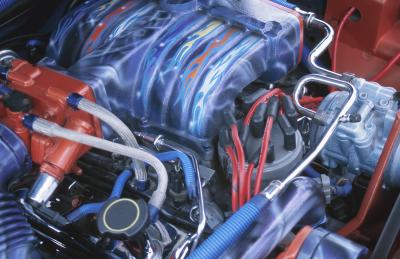
Fuel additive companies make much ado about systems cleaners -- and for good reason. Fuel injectors aren't just little nozzles that spray gas into your motor, they're precise instruments with very tight tolerances and little room for error. Injector failure isn't uncommon, particularly on older vehicles that may have seen more than their fair share of bad gas and neglect.
A fuel injector is functionally identical to the sprayer you might put on your garden hose, the primary difference being that one gets its power from your hand and the other gets it from an electromagnet. A fuel injector has a hole at the bottom where fuel goes into the motor. When the injector is off, a spring-loaded rod pushes a needle valve -- aka "pintle" -- down into that hole to block it. When power goes to a coil of wire wrapped around the top of the pintle rod, the coil magnetizes and pulls the rod upward. This opens the valve and allows high-pressure fuel to spray through.
The opening between the pintle and orifice is very small; it has to be to spray fuel in a fine, cone-shaped mist. You can see the same mechanism at work with the garden sprayer when you first squeeze down on the handle. Any debris in the fuel, be it rust or dirt from the tank or even the varnish that builds up in gasoline lines over time, can lodge in the orifice and either partially block it or wedge it open. Fuel filters contain very fine screens to catch impurities, and these screens will clog over time. A professional cleaning will often remove any debris or varnish that gets caught in the screen or makes it past.
The electromagnet mechanism that moves the pintle can break or wear out over time. The injector solenoid is very powerful, but it isn't designed to remain activated for more than a few milliseconds. If the solenoid gets power longer than it should -- either because of a computer re-tune or electrical malfunction -- it will surpass its safe "duty cycle" and burn out. But even without aftermarket tampering, the field coils in the injector can malfunction just like they might in an alternator. The bushings inside the injector, those that keep the rod moving straight, can also wear out, causing the rod to cock sideways and hang up in the injector.
Internal seal leaks aren't uncommon, particularly on older injectors. Depending on the design, an injector may contain multiple sealing rings that contain and control fuel pressure in the injector. The return spring inside your injector may also wear out, causing the injector to hang open at high duty cycles or high rpm. This would cause the injector to run normally at low rpm, then develop a misfire at higher speeds. Pintle damage is also not uncommon; it's not something that will typically happen inside the engine, but it can easily occur as a result of a botched installation job. Mechanics have been known to drop injectors or bend pintles during installation, but debris caught in the injector nozzle can do the same thing.